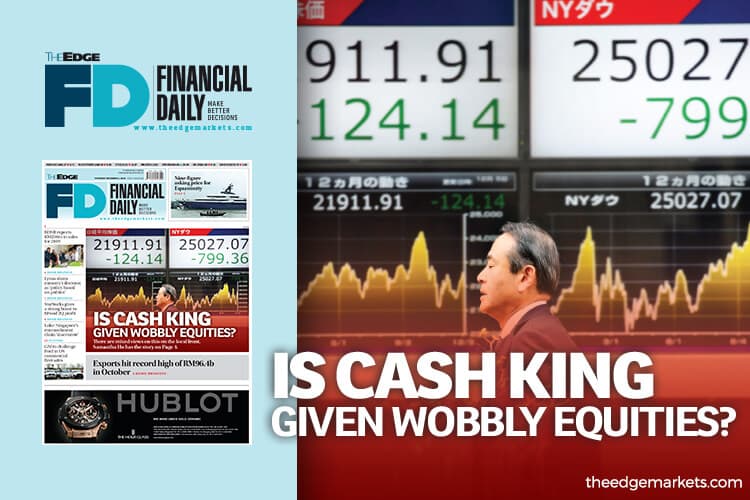
This article first appeared in The Edge Financial Daily on December 6, 2018
KUALA LUMPUR: After a year of volatility in global stock markets, the biggest funds are now firmer about trading their equity holdings for more cash.
The sharp 800-point (3.1%) drop in the Dow Jones Industrial Average (Dow) on Tuesday sent chills down investors’ spine given this is the fourth rout on Wall Street this year.
JPMorgan then joined the chorus of investment banks pointing at cash for higher returns preparing for an environment of slowing earnings growth and rising macroeconomic risks.
On the Malaysian front, however, views are mixed.
“From a US perspective, I would agree that now is the time to hold more cash. But this part of the world has seen a selldown in the past few years. Emerging markets still carry relatively low valuations,” said Danny Wong, chief executive officer of Areca Capital.
He pointed out that Asian markets have not rallied as strongly as their American counterparts since 2012, which was when the bull run was said to have started in the West.
Compared to Asian indices, the Dow and S&P 500 Index are still up more than 8% over the past three to five years. (see table)
In comparison, Asian equities have declined over the past one year compared with a continued rally in US stocks. The FBM KLCI, though not badly hit as its Chinese and Hong Kong counterparts, has recorded a 6.04% decline year to date.
“I still see Malaysia remaining attractive for the next two to three years,” Wong told The Edge Financial Daily, explaining that an expected gross domestic product (GDP) growth of over 4% for most emerging markets would make them an attractive target for foreign funds.
Malaysian stocks continue to command a premium relative to the valuations of other Asian markets. However, Wong points out that this is because Malaysia is a “traditionally defensive market”, and that dividend-yielding stocks as well as manufacturing and technology sectors may still attract investors.
That being said, not all market watchers are convinced that the local stock exchange still has much to offer.
“A trading strategy may be rewarding in the short term but the underlying economic fundamentals remain challenging,” said Vincent Khoo, head of research at UOB Kay Hian.
This is because year-end window dressing activities and optimism at the beginning of next year may only push prices up over the next one month, he said.
Pong Teng Siew, head of research at Inter-Pacific Securities, is not that optimistic either about the medium- to long-term prospects of the local bourse.
“I agree with that view [that it’s a good time to hold cash] ... it’s a view I’ve had since roughly the second quarter of this year,” he told The Edge Financial Daily.
“There was some opportunity to make money but it’s short term and fleeting — the gains don’t hold,” Pong added, echoing UOB’s Khoo.
It is worth noting that on an intraday basis, the KLCI sank by as much as 3.18% over a day in May this year. Comparatively, its highest intraday gain was only 1.55%.
Yesterday, the local benchmark dropped 6.72 points or 0.4% to close at 1,688.27, down 6.04% year to date (YTD).
The Bursa Malaysia Top 100 Index was down 0.37% yesterday while the Bursa Malaysia Small Cap Index fell 1.17%, leading to YTD losses of 9.18% and 30.04% respectively.
Pong viewed the current market condition as unlikely to shift to be more favourable of equities anytime soon, due to external uncertainty as well as the burden of Malaysia’s past economic policies.
“Globally, markets already began their downturn earlier this year. Even the rally in US markets in January wasn’t able to stem the worldwide downswing,” he said.